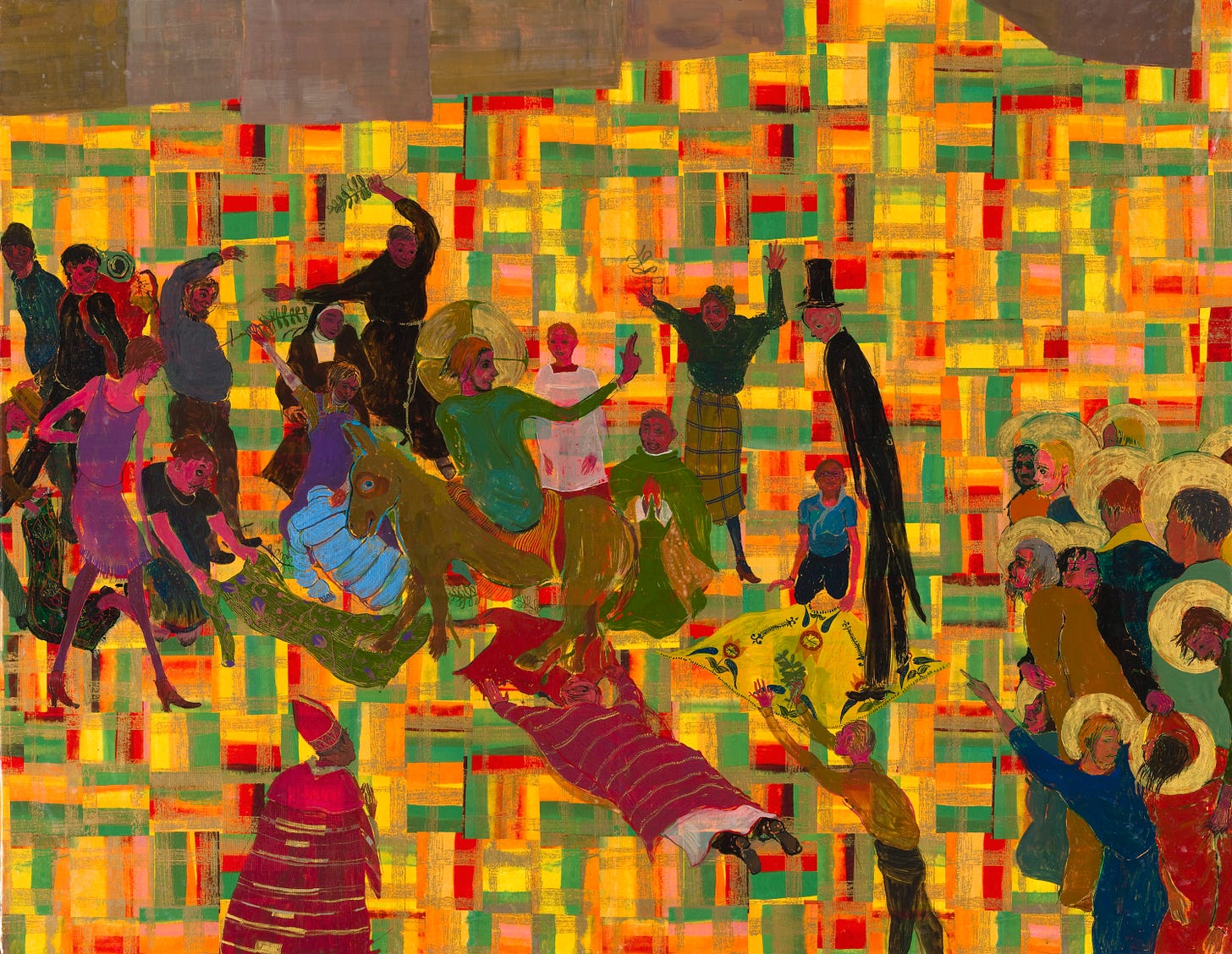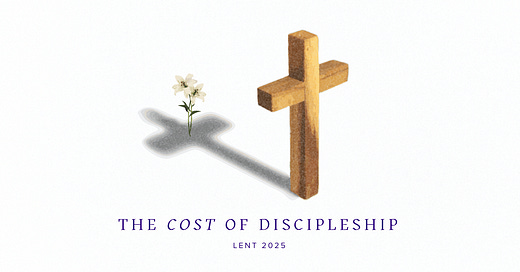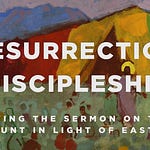If you’re expecting a parade today, you might want to head across the river into DC. This isn’t the Cherry Blossom Parade, and Jesus isn’t riding in on a float sponsored by Boeing. What we’re part of today—waving our palm branches and shouting “Hosanna!”—what Rev. Fleming Rutledge calls a “procession of fools,”[i] is less about celebration and more about confrontation.
And honestly, if you didn’t know the story, this would all look...odd.
If someone wandered in here cold—maybe from brunch or out for a run and looking for the bathroom—they’d see us waving branches like it’s a homecoming parade and think, “What on earth is going on?” And to be fair, they wouldn’t be wrong to ask.
It looks foolish.
Because it is.
A grown man riding a donkey—not even his own donkey, mind you, a borrowed one—being cheered like a king. No banners. No brass band. Just cloaks on the road, palm branches, and a crowd yelling “Hosanna!” like this is the beginning of a revolution.
But let’s talk about that donkey for a second. This is not a majestic animal. This is not a Budweiser Clydesdale. It’s a glorified pack mule. If you’re trying to make an entrance, a donkey is not how you do it.
And while Jesus is bouncing along the Mount of Olives on a beast of burden, guess who’s entering the city from the other side?
Pilate.
Rome’s regional enforcer.
Rolling in from the west on a warhorse with a thousand armed soldiers, making sure all those Passover pilgrims don’t get too inspired by stories of liberation.
On one side: imperial power, weapons, armor, domination.
On the other: a borrowed burro and a message of peace.
Tell me again, which one looks like a king?
To the crowds, to the priests, to the Romans—this was absurd.
You don’t enter a capital city on a donkey unless you’re making a joke…or a point.
Jesus was doing both.
That’s about where we are. Palm Sunday has turned into a ritual with all the glitter and none of the grit. But there’s grit in Mark’s gospel, and there’s more to this story.
Jesus sends two of his disciples ahead, telling them to go steal—er—borrow a donkey. And not just any donkey. A young one. One that’s never been ridden. Untamed. Untrained. Unspectacular. Which is to say: exactly what God uses.
This wasn’t an accident. This was theater. It was prophecy on hooves.
The prophet Zechariah had said it centuries earlier:
“Rejoice greatly, O daughter Zion! Shout aloud, O daughter Jerusalem! Look, your king comes to you; triumphant and victorious is he, humble and riding on a donkey, on a colt, the foal of a donkey.”
That wasn’t poetic coincidence. That was political theater with prophetic fire. Zechariah’s vision was of a king who doesn’t conquer with violence but comes in peace—who rides not a warhorse but a colt. A king whose power is revealed not in domination but in humility.
And the people knew it. They’d sung the words of Psalm 118 for generations at Passover:
“Hosanna! Blessed is the one who comes in the name of the Lord!”
Those aren’t just happy words—they’re the cries of a people longing for salvation. “Hosanna” means “save us now!” It’s a desperate plea wrapped in a shout of praise.
And so when Jesus rides into Jerusalem, he’s not just fulfilling a prophecy—he’s stepping into a liturgy that’s already been running for generations. He’s answering their song with his presence. He’s embodying the very salvation they’re crying out for…
Just not in the way they expect.
Because they wanted a king to save them from Rome.
But Jesus came to save them from a deeper captivity.
They wanted revolution by the sword.
Jesus came to bring redemption through the cross.
This wasn’t random. This was revelation. The people were waving branches because they knew the script. But Jesus was rewriting the ending.
In a city filling up with pilgrims for Passover, Mark wants us to know that Jesus chose a donkey, not a warhorse. That’s how kings in the ancient world made their triumphal entries—riding stallions, armored and proud. Not Jesus. He rides a borrowed burro, a peace sign on four feet. The crowd shouts “Hosanna!” (which means “Save us now!”) as if Jesus is about to overthrow the empire.

As Jesus rides that donkey, he is a living, breathing parable. This is not how power works, he seems to say. This is not how kings conquer. This is not how salvation comes.
Mark doesn’t spell it out, but we know the contrast: Pilate, the symbol of empire, entering from the west on a warhorse. Jesus, the prince of peace, from the east on a donkey.
Two processions.
Two theologies.
Two kinds of kings.
And we like to think we’d choose the donkey. But let’s be honest: we love us a little empire now and then. The warhorse is faster. Stronger. Shinier. It gets stuff done. The donkey? The donkey might as well be a walking delay. No offense to donkeys.
But there’s the point.
The kingdom Jesus rides in is not fast. It’s not efficient. It’s not violent. It’s slow. Gentle. Subversive. And we didn’t—and still don’t—have much patience for that.
And here’s where we misunderstand humility.
Because when we say Jesus is humble, we don’t mean meek in the sense of being timid or soft-spoken. We don’t mean gentle as in passive. This isn’t false modesty or avoidance of conflict. No—biblical humility is something far deeper and stronger. It’s about authority rightly held; power rightly restrained.
To be humble, in the way Jesus is humble, is to possess divine authority and yet choose not to wield it for personal gain. It’s to have every right to call down angels and armies—and instead to take the place of the afflicted and the suffering.
Humility, in the kingdom of God, means solidarity with the broken.
It means being able to walk into the city on a warhorse… and choosing the donkey anyway.
Jesus doesn’t lack power. He just refuses to lord it over others.
That’s what makes this procession so radical. It’s not the absence of power—it’s the refusal to misuse it.
We wave our palms today and sing our hosannas, but we know what’s coming. There is no fast-forward button from the donkey to the empty tomb. Rev. Rutledge reminds us: “There is no passage from Palm Sunday to Easter without Good Friday.”
On Monday, Jesus will walk into the Temple and flip tables like your cousin at Thanksgiving dinner after someone mentions politics. He’ll call out the whole religious racket—how they’ve turned God’s house into a den of thieves. That’s when the powers start to really take notice.
On Tuesday, he’ll spar with Pharisees and Herodians and Sadducees. He’ll teach about paying taxes, about resurrection, about love. He’ll say things like “Love the Lord your God” and “Love your neighbor as yourself,” which doesn’t sound revolutionary...until it gets you killed.
On Wednesday, he’ll retreat to the Mount of Olives. There, he’ll lay out the story behind the story: the cosmic collision that’s underway. He’ll warn of destruction and promise redemption. It’s apocalyptic, which is just a fancy word for revealing what’s real.
Thursday, he’ll take bread and wine and say, “This is me.” He’ll wash feet like a servant. He’ll weep in a garden. He’ll be betrayed with a kiss.
And then Friday… well, Friday’s a lynching disguised as justice. The warhorse wins. Or so it seems.
But we begin the week on the back of a borrowed burro.
The donkey is a symbol. Not just of peace but of resistance. Not the resistance of violence, but the resistance of vulnerability. Of grace. Of trusting a God who doesn’t save with swords but with scars.
Maybe that’s why it feels foolish to wave a palm. Maybe we’re embarrassed because, deep down, we know this way of peace is harder than it sounds.
It would be easier to celebrate Jesus today, Spring Break tomorrow, and come back next Sunday for the lilies and the hallelujahs. But that’s not how this works.
Jesus rides in not to conquer but to be killed. Not to dominate but to deliver.
And this, friends, is just Act One. So don’t rush the ending.
Remembering Jesus’ triumphant entry into Jerusalem, we are confronted by the cost of discipleship that begins with the cross. Writing in the shadow of the Third Reich, Dietrich Bonhoeffer understood that Jesus’ triumphal entry wasn’t a victory march but a procession toward sacrifice. He wrote, “As we embark upon discipleship we surrender ourselves to Christ in union with his death—we give our lives to death.”[ii]
The palms we wave today will soon be forgotten—much like the crowd’s memory of welcoming Jesus into the city. The same crowd waving palm branches… some would soon turn their backs on Christ, leaving us to ask: What does it mean for us to follow Jesus?
The cost of discipleship is found in surrendering to the self-giving love of Christ. Jesus’ journey into Jerusalem challenges us to consider what it will cost to follow him.
Will we choose the warhorse or the donkey?
Will we crown him king or call for his cross?
This is not just a parade. It’s a procession of fools—holy fools—who believe that love is stronger than death, that peace is more powerful than violence, and that a borrowed donkey is somehow the ride of a king.
Amen.
[i] Rutledge, Fleming. The Undoing of Death. Eerdmans. 2002. Pg. 26
[ii] Bonhoeffer, Dietrich. The Cost of Discipleship. Translated by R.H. Fuller, 2nd ed., Macmillan, 1963, p. 99.

















Share this post